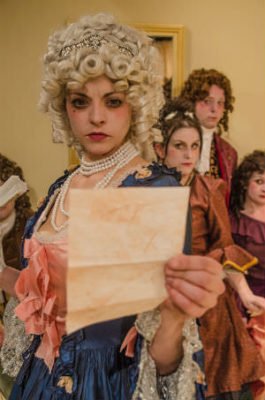La Bête
Directed by Kay Martinovich
Produced by Trap Door Theatre
Loquacious Virtuosity on Display
La Bête—the beast—is a play about the clash between high and low art. It imagines a conflict between Moliere, here called Elomire, and an amazingly obnoxious street clown. Playwright David Hirson’s choice of that author as his hero is not due to that writer’s specific work, but because he was a neo-classicist with significant patronage, and he provides an excuse for writing in rhyming couplets. The result is that Trap Door’s production makes Hirson’s play a pleasure for the ears, which proves the work truly belongs on the side of high art, an especially major accomplishment since Hirson was young when he wrote it. The story itself is simple when scrutinized, but the production is so delightful that anyone with an interest in art will surely be glad to have invested their evening in Trap Door’s cozy space.
The play begins with Elomire (Jesse Dornan) and his friend and company member Bejart (Casey Chapman) in a heated debate over what do about a royal command to audition a new company member. The princess (Ann Sonneville) has taken a liking to the street clown Valere (Kevin Cox), and wants him to join the troupe. Bejart thinks it’s better to go along with what the princess wants, but to Elomire, this is so contrary to the purpose of his art there would be no point in doing it if they had to take Valere on. This is not a light decision, for the troupe has only been with the princess for a year. Before that, they had toured through small towns, to great financial and emotional stress, and are now getting on in age. Bejart has to agree that Valere’s acting is shallow and unrefined, and he couldn’t particularly remember a play he saw Valere put on once, or just doesn’t want to talk about it. Furthermore, Valere has a habit of praising others as an excuse for changing the conversation to himself in a way that is very annoying.
We soon see just how much. As soon as Valere enters he begins talking. And he does. Not. Stop. His opening monologue lasts for at least half an hour. And in that time, he heaps praise on Elomire only to redirect it back to himself, genially insults everybody, claims a knowledge of classicism he immediately proves false, and asserts himself and Elomire to be on a higher plane of understanding than the rest of the world’s foolish people. Cox has become one of my favorite actors, and he’s brilliant here. It’s not just that he says so much so clearly, but that he inhabits every moment of this speech, so that even though Valare drives home the same point again and again, each paragraph seems like a sudden new thought he excitedly piles on top of the one before. Long before he reached the end, my eyes watered from a mixture of laughter and agony.
When Valere is finished, he is so dim-witted he can hardly understand Elomire is hostile to him. But when it finally does get through, he attempts to take Elomire’s criticism to heart. It’s tragic in a way that he is for whatever reason psychologically incapable of adjusting his persona, because Cox plays him with momentary vulnerability and sincerity. The princess has to admit that Elomire has a good point about him, but nonetheless, the reason she suggested taking him on is that the troupe had gone stale and needed something new to remain entertaining. Elomire makes a challenge: have Valere perform one of his works with the company. If they are all still impressed, Valare stays, but it is likely Elomire will go.
Dornan’s Elomire, despite his real-life inspiration, is notably stern. He has every right to be offended by Valere down to the deepest part of himself, but I get the feeling there might be something to the princess’s complaint he’s a bore. Sonneville’s princess is dangerous without being malicious. Conscious of her status, she hates to intrude on others. She’s willing to listen to Elomire’s objections, and yet, Sonneville never lets us forget that she’ll use her power to get her way. Chapman’s graceful Bejart represents pragmatism, and seems less principled than Elomire. But as a hunchback who’s sensitive enough to conceal his deformity under a shoulder pad, he’s used to playing humiliating roles under Elomire as well. Given the time period, costume designer Rachel Sypniewski has a great opportunity for fancy clothes, wigs, and make-up, and she makes the most of it. The people are a spectacle onto themselves, and Carolyn Voss’s tastefully restrained set design allows the gowns, frock coats, and yards of curls to keep our visual attention.
The purpose of the play is to deliver a parable about a rather simple dilemma, and is possible to quibble with it. Elomire delivers a brilliant take-down of Valere’s show in a monologue of his own that any critic would be envious of. But we never see his own work, just other peoples’ reports that it is boring. If he delivers such insightful commentaries on themes relevant to his audience, why wouldn’t his shows be interesting? You can’t always blame the audience for not getting it. Of course, it is possible Elomire is not meant to be totally in the right, but why exclude legitimate criticism of him? Still, the show is captivating, thanks to the skill of the actors, the flashiness inherent in the design, and Hirson’s beautiful language. Valare is the only character who is consciously rhyming; everybody else’s couplets are subtler, illustrating one of Elomire’s points. You can see the ending from a mile away, but the journey there exhibits the finest stagecraft. Director Kay Martinovich keeps a play about the difficulties and complexities of the artistic process accessible, and keeps the energy high in a very talk-heavy drama. Plus, whatever you can say about Valare’s intellect, he’s a hilarious clown.
Highly Recommended
Jacob Davis
Reviewed March 27, 2015
This show has been Jeff Recommended
For more information, see La Bête’s page on Theatre in Chicago.
Playing at Trap Door Theatre, 1655 W Cortland Ave, Chicago. Tickets are $20-25 with two-for-one deals on Fridays; to order, call 773-384-0494 or visit www.trapdoortheatre.com. Runs Thursdays, Fridays, and Saturdays at 8:00 pm through April 25. Run time is two hours, with one intermission.



